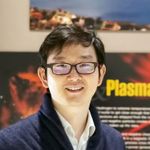Researchers in the Department of Astronomy at Boston University are engaged in a number of programs to understand how stars, their protoplanetary disks and their orbiting exoplanets form and evolve.
Faculty with Related Research |
|
|---|---|
| Research Interests:
star-terrestrial planet interactions in our solar system and beyond; magnetic reconnection and turbulence; wave-particle interaction; physics-informed machine learning; high intensity laser-plasma interaction |
|
| Research Interests:
young stars, planet formation, circumstellar disk structure and evolution, multiwavelength variability, radiative transfer modeling |
|
| Research Interests:
high-precision observations of the endpoints of stars, planets, and binary systems, asteroseismology, time-domain astrophysics, space-based photometry, persistent gravitational wave sources |
|
| Research Interests:
exoplanets, low-mass stars, instrumentation |
|
| Research Interests:
computational and theoretical plasma physics in space and astrophysics; interaction of the solar system with the interstellar medium; solar wind; shocks in the lower corona, T-Tauri and solar-like stars |
|
Research Facilities
We make heavy use of both ground and space-based telescopes including:
- the Hubble Space Telescope
- the Spitzer Space Telescope
- our own Perkins Telescope Observatory, a 1.8m optical-infrared facility outside Flagstaff, AZ
- shared facilities at Lowell Observatory:
- the 4.3m Lowell Discovery Telescope (formerly Discovery Channel Telescope)
- the 42-inch Hall Telescope





